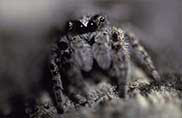
Description
Spiders have eight legs, two body regions, no wings or antennae. Some spiders like moisture and are found in basements, crawl spaces and other damp parts of buildings. Others like dry, warm areas such as subfloor air vents, upper corners of rooms and attics. They hide in dark areas.
Habits
They feed on insects, other spiders and any other prey they are able to subdue. Spiders have three or four pair of eyes. Many spiders have poor vision, but some species of spiders, such as the jumping spider, have exceptional vision. Spiders do not have chewing mouthparts and commonly utilize digestive enzymes in their saliva to break prey down before consuming it. Additionally, the gut of a spider is too narrow to allow for consumption of large food particles. Almost all spider species are predators, although one plant-feeding species has been documented.
Spiders are capable of producing silk that is elastic, adhesive and strong. This silk is used to spin webs as well as to construct egg sacs and line spider dwellings. The size and shape of spider webs vary by species: some are orb-shaped, while others are funnel-shaped; some webs are orderly, while others appear haphazard. Some spider species live in burrows rather than webs, while others are free ranging and take refuge in crevices.
Defense
- Keep Spiders Out to Begin WithA good way to prevent spiders from getting into your home, is to make sure you don’t have an environment around your house that attracts spiders. Spiders often make their homes outside in plants, piles of leaves or wood, or dark undisturbed places like old tires or buckets. Having these things right next to your house makes it more likely that a spider will wander in. Create some distance between these things and your house, to make it less likely that a spider finds a way inside
- Get Rid of Their Food Source and SheltersMaking sure that your house is clean is generally a good way to decrease the number of pests in your home. In the case of spiders, not only will a clean home provide fewer places for the spiders to hide, but it will also make it less likely that small insects will be around for the spiders to eat. Without a reliable food source, and with fewer hiding spots, it will be harder for spiders to stay.
A pest control professional should be contacted for assistance.